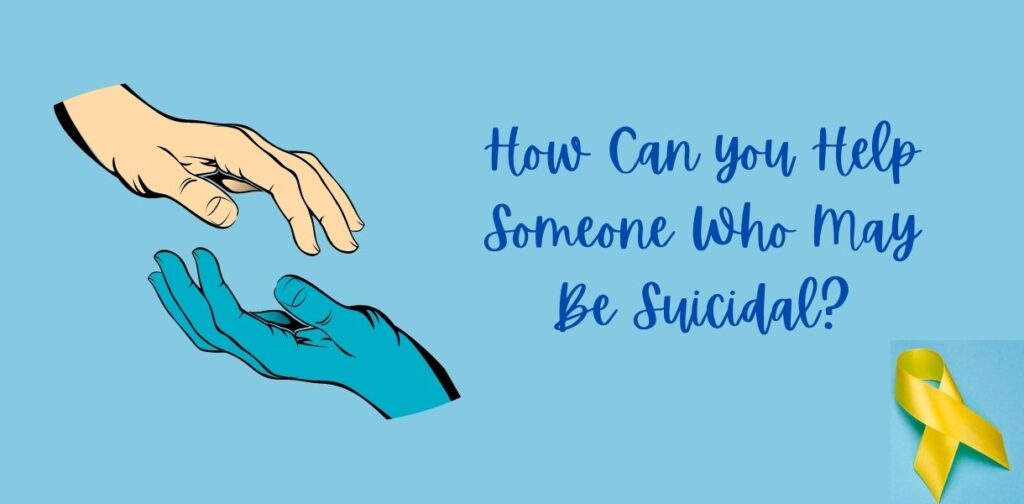How Can you Help Someone Who May Be Suicidal? or what should you do if a friend, relative or colleague seems to be suicidal? Do you know According to WHO Every year 703 000 people take their own life and there are many more people who attempt suicide. Every suicide is a tragedy that affects families, communities and entire countries and has long-lasting effects on the people left behind. Suicide occurs throughout the lifespan and was the fourth leading cause of death among 15-29 year-olds globally in 2019.
Table of Contents
How Can you Help Someone Who May Be Suicidal?
1. Take It Seriously
Myth: “The people who talk about it, don’t do it”.
Studies have found that more than 75% of all completed suicides did things in the few weeks or months prior to their deaths to indicate to others that they were in deep despair. Anyone expressing suicidal feelings needs immediate attention.
Myth: “Anyone who tries to kill himself has got to be crazy”.
Perhaps 10% of all suicidal people are psychotic or have delusional beliefs about reality. Most suicidal people suffer from the recognized mental illness of depression; but many depressed people adequately manage their daily affairs. The absence of “craziness” does not mean the absence of suicide risk.
Myth: “Those problems weren’t enough to commit suicide over”.
This is often said by people who knew someone who committed suicide. You cannot assume that because you feel something is not worth being suicidal about, that the person you are with feels the same way. It is not how bad the problem is, but how greatly it’s hurting the person who has it.
2. Remember, suicidal behaviour is a cry for help
Myth: “If someone is going to end their life, nothing can stop him/her”.
The fact that a person is still alive is sufficient proof that part of him wants to remain alive. The suicidal person is ambivalent – part of him wants to live and part of him wants death as he wants the pain to end. It is the part that wants to live that tells another “I feel suicidal.” If a suicidal person turns to you it is likely that he believes that you are more caring, more informed about coping with misfortune, and more willing to protect his confidentiality. No matter how negative the manner and content of his talk, he/she is doing a positive thing and has a positive view of you.
3. Be willing to give and get help sooner rather than later
Suicide prevention is not a last minute activity. All studies on depression say the person should receive support right away. Unfortunately, suicidal people are afraid that trying to get help may bring them more pain and they fear that they will not be understood or accepted. Seeking professional help can help the person manage or relieve stress. An individual who feels accepted and feels understood can manage their feelings of distress, which will reduce the risk of suicide.
4. Listen
Give the person every opportunity to unburden his troubles and ventilate his feelings. You don’t need to say much and there are no magic words. If you are concerned, your voice and manner will show it. Give him relief from being alone with his pain; let him know you are glad he turned to you. Avoid arguments and advice giving.
5. Ask “Are you having thoughts of suicide?”
Myth: “Talking about it may give someone the idea”.
People already have the idea; suicide is constantly in the news media. If you ask a despairing person this question you are doing a good thing for them: you are showing him that you care about him, that you take him seriously, and that you are willing to let him share his pain with you. You are giving him further opportunity to release pent up and painful feelings. If the person is having thoughts of suicide, find out how far along this ideation has progressed.
6. If the person is acutely suicidal, do not leave him/her alone
If the means are present, try to get rid of them. Detoxify the home. Do not allow the person to be isolated.
7. Urge professional help
Strongly encourage the person to talk to a doctor, counsellor, psychiatrist or to call mental health support numbers. At the same time, let the person know you care and want to maintain contact. You could even offer to accompany him/her to meet the professional.
8. No secrets
It is the part of the person that is afraid of more rejection that says “Don’t tell anyone.” It is the part that wants to stay alive that tells you about it. Respond to that part of the person and persistently seek out a mature and compassionate person with whom you can review the situation. (Do not try to go it alone. Get help for the person and for yourself. Talk to an older responsible family member, a doctor or counsellor. If it is a colleague, then speak to your manager or HR)
9. From crisis to recovery
Most people have suicidal thoughts or feelings at some point in their lives; yet less than 2% of all deaths are suicides. Nearly all suicidal people suffer from conditions that will pass with time or with the assistance of a recovery program. There are hundreds of small steps we can take to improve our response to the suicidal and to make it easier for them to seek help.
10. Be Aware of Warning Signs
There is no typical suicide victim. It happens to young and old, rich and poor. But fortunately there are some common warning signs which, when acted upon, can save lives.
A suicidal person may:
· Talk about committing suicide.
· Have trouble eating or sleeping.
· Experience drastic changes in behaviour.
· Withdraw from friends and/or social activities.
· Lose interest in hobbies, work, school, etc.
· Prepare for death by making out a will and final arrangements.
· Give away prized possessions.
· Have attempted suicide before.
· Take unnecessary risks.
· Have had a recent severe loss.
· Be preoccupied with death and dying.
· Lose interest in their personal appearance.
· Increase their use of alcohol or drugs.
View in gallery (click image to enlarge)
Disclaimer : This article is only for educational and awareness purposes. Content copyrights goes to its creator.








